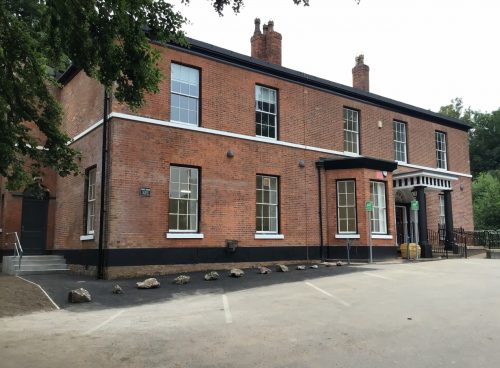Property round-up: MC Construction; Adlington Retirement Living; St James Business Centre; Flexible workspace

An historic council-owned building in Stockport has been refurbished to provide modern offices for community-based adult social workers.
Salford-based MC Construction has completed a project which has created new office space on the first floor of Gatley Hill House, a former public library on Church Road, Gatley.
The Georgian mansion house, built in the mid-18 th century, houses a community centre on the ground floor which the council rents out for meetings and social events.
The first floor had been vacant for years but has now been brought back into use as office space for around 40 social workers covering Gatley, Cheadle and Bramhall, who are relocating from other existing offices around the borough.
Jo Smith, construction lead for Stockport Council, said: “Thanks to the successful completion of this project, the team has a much better and bigger working environment and will be able to operate more effectively.
“The works carried out by MC Construction have preserved and significantly enhanced the condition of the building in a manner that is sympathetic to its heritage, which is extremely satisfying to see.”
The project included the installation of a new roof, windows and rainwater goods, underpinning, interior partitions and doors, new mechanical and electrical systems, a refurbishment of the kitchen and washrooms, new office access and fire alarm systems, a rewire, and decoration. Original features were repaired and refurbished wherever possible.
David Lowe, managing director of MC Construction, said: “The project has greatly modernised a lovely historic building which was in need of significant repair, leading to an improved appearance, restoring the first floor to good use, improving the energy performance of the building and positively benefiting the environment with the installation of electric vehicle charging points.”
::

Restaurant facilities at The Sidings
A new Adlington Retirement Living community in Lytham, has reserved almost 50% of its luxury apartments, two months ahead of completion.
Construction began in late 2020 at The Sidings, a new Adlington Retirement Living community, located next door to Booths in Lytham.
The new community, on Wharf Street in Lytham, will offer 65 one-, two- and three-bedroomed retirement apartments for the over 55s, in a safe and secure environment, with the benefit of patios or walk-out balconies to most apartments.
Alexandra Johnson, sales and marketing director for Adlington Retirement Living, said: “Our award-winning approach to independent living, ensures homeowners don’t have to compromise on their lifestyle, their social life or their independence. We aim to provide a community spirit, whilst promoting independence and individual respect. It’s a chance to become part of a thriving community of like-minded people, with a shared outlook.”
Alexandra added: “More of our homeowners are choosing to move to retirement communities whilst they’re fit and healthy, to future-proof their retirement.”
Each apartment at The Sidings in Lytham has been designed to make everyday life easier, safer and more comfortable. Every detail has been considered from the natural light and user-friendly layout to the spacious storage cupboards and private patios or balconies.
::

St James Business Centre atrium
St James Business Centre, the 80,000 sq ft hub for SMEs on Wilderspool Causeway in Warrington, enjoyed a spate of new lettings and space up-sizes in the second quarter.
Five per cent of the building’s space was snapped up by a raft of new and existing tenants as the town’s economy continues to demonstrate its inherent strength. Data from the influential Centre for Cities thinktank shows Warrington to be one of the North’s most entrepreneurial business locations.
“The breadth of businesses in St James continues to grow and it’s something of an entrepreneurial hot-spot,” said building manager Laura Moore from Langtree, which manages the development as part of its Wire Regeneration joint venture with Warrington Council.
“Our latest lettings show existing tenants expanding and new tenants arriving, both solid indicators of the strength of the local economy and the quality of our offer in the building,” she added.
The new deals include:
- KN Circet, a telecoms network engineering and maintenance provider, which has increased its space to 1,000 sq ft
- Total Rail, providers of project management solutions for the rail sector – 235 sq ft
- Local care provider Acute Need – 409 sq ft
- ABL, which has increased its space to 900 sq ft
- Vincent Sykes Solicitors – 135 sq ft
St James Business centre provides a range of modern, flexible business spaces on short and long term leases and includes a café and a large business lounge in the sunlit atrium.
Centre for Cities’ research shows that Warrington scores highly with key Northern competitors on a range of metrics. Its business density – the number of businesses per 10,000 people – is 57% greater than Liverpool’s, while Warrington’s patent application rate is almost a quarter higher than in Leeds. Meanwhile, the town’s business start-up rate is more than 35% higher than Newcastle-upon-Tyne and almost three times higher than that of Manchester.
::

Corporate occupiers such as Uber, WPP and Currys are among the household names that have cited their likely future use of flex space, and industry predictions show that it will make up more than 30% of future portfolios.
However, according to research from The Instant Group and EG, if just 20% of corporate office portfolios moved to flexible workspace, there would be a shortfall of nearly 100 million sq ft.
Fortunately, flex markets in cities such as Manchester, Leeds and Liverpool are already mature, with the market share increasing significantly over the past few years as a result of tenants’ changing priorities.
Regional markets are key targets for operators in 2022, with Cubo and Wizu opening in Leeds, Serendipity Labs and X+Why entering the Manchester market, and Sciontec launching a flex offering at the Royal College of Physicians in Liverpool.
On the hunt for cost reduction and access to a wider talent pool, many businesses are incorporating regional hubs into their office portfolios or relocating their head offices outside London.
Anna Reed, data director at EG, said: “As existing leases come to an end, the need for flex space will continue to grow as occupiers search for a new approach to office life. The pandemic placed focus on the importance of office layouts and peoples’ desires to work in a more flexible way, which will continue in the foreseeable future. Occupiers will see flex space as key to keeping staff happy and engaged.”
Across England and Wales, around 626 million sq ft of traditional office space is currently leased, and if we saw just a 10% shift of occupiers towards flex space, this would create a shortfall in flex supply of around 39.9 million sq ft. With contractual occupancy rates within flexible workspaces continuing to rise, this shortfall will only grow, creating a huge growth opportunity for the workspace industry.
The increasing amount of vacant traditional office space currently in the market could provide the solution to flex supply growth and would transform the flexible workspace landscape across the UK benefiting both landlords and occupiers.
Craig Hughes, of The Instant Group, said: “Overall, the flex market in England and Wales would need to grow by 40%, and only the more mature markets of Birmingham and Manchester would need to deliver growth of under 20%, with all other UK towns and cities requiring supply growth of 35% and above.
“Any movement of traditional occupiers above 10% would result in a severe shortfall of flex supply, with demand outpacing available flexible space.”








